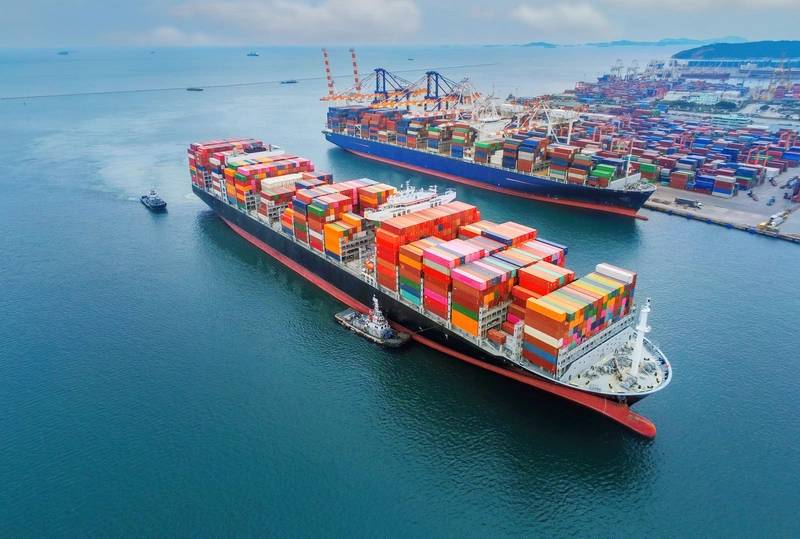Global Trade War Worries Grow as Trump Unveils Sweeping Tariffs
April 3, 2025

The global economy is bracing for renewed turbulence following U.S. President Donald Trump’s announcement on Wednesday of sweeping new tariffs, triggering fears of a global trade war and sparking immediate market and political reactions.
According to the White House, the new measures include a 10% minimum tariff on most imported goods, with certain products - particularly those from major U.S. trade partners like China, South Korea, Japan, and the European Union - facing duties as high as 25%. Oil, gas, and refined petroleum products have been exempted from the tariffs for now, though the broader economic fallout is expected to be significant.
Impact on U.S. Businesses and Consumers
Niels Rasmussen, Chief Shipping Analyst at BIMCO, warned that U.S. businesses and consumers would bear the brunt of the increases, as the new tariffs apply to nearly 80% of imported goods.
"We expect that the tariff increases will hurt U.S. businesses and consumers the most as they will see cost increases on nearly 80% of imports," said Rasmussen. "In the U.S., the tariffs are likely to lead to increased inflation and lower economic growth."
Rasmussen emphasized that the global impact could be far-reaching, especially if major trading partners implement retaliatory tariffs.
“If trading partners respond in kind, the impact on the global economy and global trade would exceed the OECD estimates,” he said, referencing a 2024 OECD model that predicted a 0.3% decline in global output by the third year and close to 2% drop in trade volumes under a more conservative 10% tariff scenario.
Shipping Industry in the Crosshairs
The container shipping sector is expected to be hit particularly hard. While bulk commodities and tankers are largely exempted from the tariff hikes, most containerized goods are not. BIMCO estimates that a stagnation in U.S. container imports alone would reduce global container volume growth by 0.5 percentage points.
“It remains to be seen how U.S. consumers will react,” Rasmussen added. “Reduced discretionary spending could impact the travel and service sectors, though increased demand for goods could somewhat offset the blow to shipping.”
Oil Prices Plunge on Trade War Fears
Markets reacted swiftly to the announcement. On Thursday, Brent crude fell 3.55% to $72.29 per barrel, while U.S. West Texas Intermediate (WTI) dropped 3.75% to $69.02, according to Reuters.
Analysts cited concerns over slowing global economic growth and reduced fuel demand. "The U.S. tariff announcement clearly caught markets off guard," Yeap Jun Rong, a strategist at IG, said for Reuters. "The focus now shifts to the global growth outlook, which is likely to be revised downward due to these higher-than-expected tariffs.”
Adding further pressure to oil markets, the U.S. Energy Information Administration reported an unexpected 6.2 million-barrel build in crude inventories, defying analyst expectations for a decline.
EU and Allies Prepare to Retaliate
European Commission President Ursula von der Leyen condemned the tariffs, labeling them a "major blow to the world economy" and warning that the EU is preparing countermeasures if negotiations with Washington fail.
The EU is finalizing a first round of retaliatory tariffs worth up to €26 billion ($28.4 billion), with further measures anticipated in the future, Reuters reported.
"We're now preparing for further countermeasures to protect our interests and our businesses if negotiations fail," von der Leyen was cited as saying.
The European Central Bank estimates that a 25% blanket U.S. tariff on European imports would lower eurozone growth by up to 0.3 percentage points. Meanwhile, some EU leaders are considering targeted countermeasures, including restricted access to public procurement and services markets for U.S. firms.
What Comes Next?
With major economies signaling tit-for-tat responses, fears of a prolonged trade war are mounting. French President Emmanuel Macron is meeting with affected industries, while Italian Prime Minister Giorgia Meloni said a diplomatic solution remains possible - though retaliation is not off the table.
As of now, U.S. consumers, businesses, and trade partners alike are facing heightened uncertainty, and global markets are entering what analysts warn could be a period of sustained volatility.
"Countermeasures are imminent. Recession and stagflation have become terrifying possibilities,” Tamas Varga, an analyst at PVM said for Reuters.






